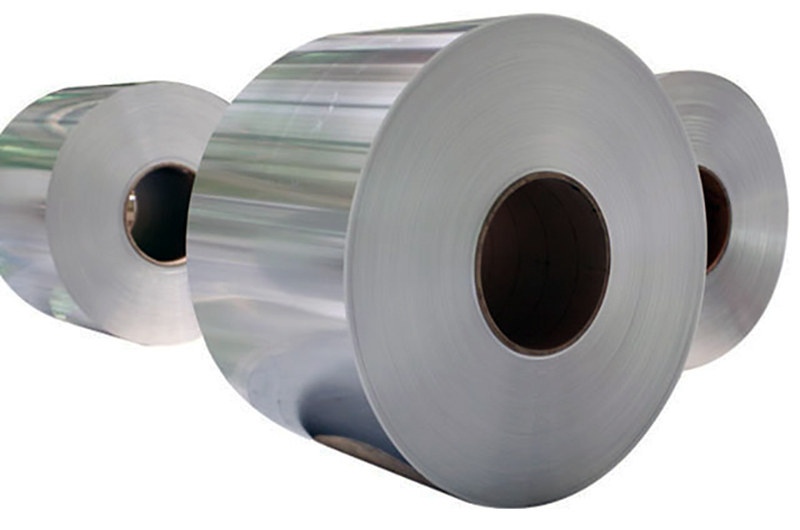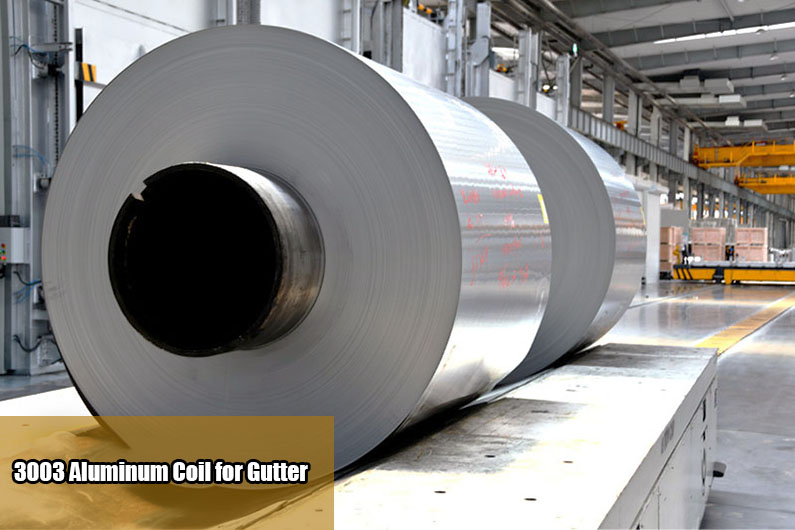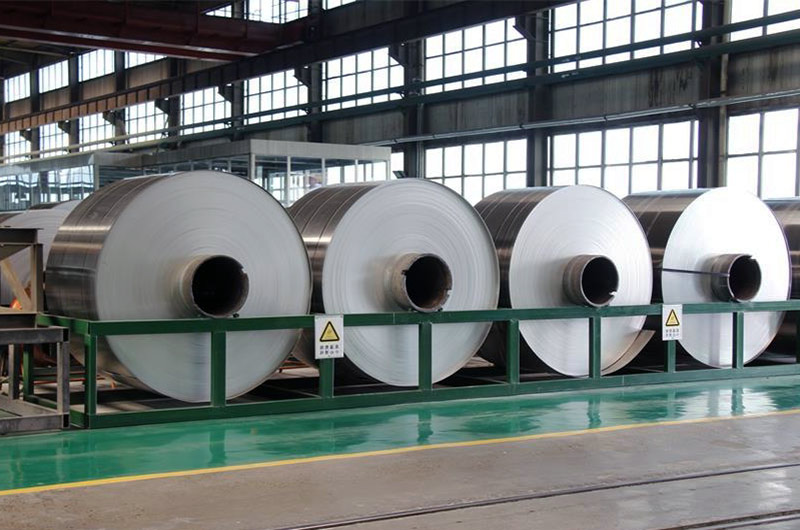Aluminum Coil for Gutter Introduction
When it comes to protecting your home from water damage, a reliable gutter system is a vital component. Gutters are designed to channel rainwater away from your roof, walls, and foundation, preventing structural issues and water-related problems.
While various materials can be used to make gutters, aluminum coil is a popular choice, valued for its durability, low maintenance, and versatility.
In this comprehensive content, we will explore the use of aluminum coil for gutters, discuss other materials commonly used for gutters, highlight the differences between aluminum and alternative materials, provide examples of aluminum coil gutter applications in everyday life, and delve into the advantages and disadvantages of aluminum gutters.

We will also discuss alloy selection, surface treatments, commonly used specifications, common production challenges, and issues that can arise during gutter use and how to address them.
Why Aluminum Coil for Gutters?
1. Durability
One of the primary reasons aluminum coil is used for gutters is its exceptional durability. Aluminum is naturally corrosion-resistant, which means it can withstand exposure to rain, snow, and moisture without deteriorating or rusting over time.
This durability ensures that aluminum gutters have a long service life, reducing the need for frequent replacements.
2. Lightweight Nature
Aluminum is remarkably lightweight, making it easy to handle and install gutters. This reduces labor and structural requirements during installation, making the process more manageable and cost-effective.
3. Low Maintenance
Aluminum gutters are virtually maintenance-free. They do not require regular painting or sealing to maintain their appearance and performance. Routine cleaning and inspections are generally sufficient to keep them in good condition.
4. Aesthetic Versatility
Aluminum gutters come in various profiles, colors, and finishes, allowing homeowners to choose options that complement the style and design of their homes. This versatility ensures that gutters can seamlessly blend with the overall aesthetics of the property.
5. Recyclability
Aluminum is highly recyclable, making it an eco-friendly choice for gutters. When an aluminum gutter reaches the end of its service life, it can be recycled into new aluminum products, reducing environmental impact.
Alloy Choices for Aluminum Gutters
Aluminum gutters are typically made from specific aluminum alloys chosen for their ideal properties. The choice of alloy may vary based on the specific requirements of the gutters. Commonly used alloys for gutters include:
- 3003 Aluminum Coil for Gutter: This alloy is known for its formability and resistance to corrosion. It is often used in residential and commercial gutters.
- 6063 Aluminum Coil for Gutter: 6063 is valued for its extrudability and resistance to corrosion, making it suitable for custom-shaped gutters and profiles.

Surface Treatments for Aluminum Gutters
1. Powder Coating
Powder coating is a common surface treatment for aluminum gutters. It provides an attractive finish, protects the aluminum from UV radiation, and enhances corrosion resistance.
2. Kynar Coating
Kynar coating is a premium surface treatment that offers exceptional durability and resistance to fading. It is often used in areas with high UV exposure.
Commonly Used Specifications for Aluminum Gutters
The specifications for aluminum gutters can vary based on the manufacturer and product design. Common specifications include gutter profile, width, thickness, and color. Standard gutter profiles often include K-style and half-round, with typical widths ranging from 5 inches to 6 inches.
Other Materials for Gutters
While aluminum is a popular choice for gutters, other materials are also used. These materials include:
1. Vinyfor Gutters
Vinyl gutters are lightweight, easy to install, and affordable. They do not rust or corrode but may be more susceptible to damage from extreme temperatures.
2. Copper for Gutters
Copper gutters provide a distinct and visually appealing appearance with their natural patina finish. They are known for their longevity but come with a higher initial cost.
3. Steefor Gutters
Steel gutters are robust and durable, making them suitable for areas with heavy snow loads or extreme weather conditions. However, they may require regular maintenance to prevent rust.
4. Galvanized Steefor Gutters
Galvanized steel gutters are steel gutters with a protective zinc coating to enhance corrosion resistance. They are suitable for areas with moderate weather conditions.
Differences Between Aluminum and Alternative Materials
1. Durability
Aluminum is naturally corrosion-resistant, providing lasting durability in a wide range of environments. Vinyl and steel gutters may require more maintenance to prevent rust and corrosion.
2. Weight
Aluminum gutters are significantly lighter than copper and steel gutters, making them easier to install and reducing structural demands.
3. Cost
Aluminum gutters are generally more affordable than copper gutters and competitively priced with steel and vinyl options.
4. Aesthetic Options
Aluminum gutters offer numerous aesthetic choices, including various colors and finishes, while copper gutters naturally develop a patina. Vinyl gutters are typically white or limited in color options.

Common Examples of Aluminum Coil Gutters in Everyday Life
1. Aluminum gutters for Residential Homes
Aluminum gutters are commonly used in residential applications to protect homes from water damage. Their lightweight and durable nature makes them an ideal choice for homeowners.
2. Aluminum gutters for Commercial Buildings
Commercial properties, such as office buildings, retail centers, and warehouses, often feature aluminum gutters due to their long-term reliability and low maintenance requirements.
3. Aluminum gutters for Industrial Facilities
Industrial facilities, including manufacturing plants and warehouses, rely on aluminum gutters to prevent water-related issues and maintain structural integrity.
4. Aluminum gutters for Educational Institutions
Schools and universities often install aluminum gutters to protect their buildings and infrastructure from water damage.
Disadvantages of Aluminum Gutters
1. Limited Insulation
Aluminum gutters do not provide significant insulation for homes. They may be less effective at regulating temperature compared to copper or steel gutters.
2. Denting
Aluminum is relatively soft compared to steel, making aluminum gutters more susceptible to dents from falling debris or impacts.
Common Problems in the Production Process
1. Imperfections in Surface Coatings
Surface coatings must be applied uniformly to ensure long-lasting performance. Imperfections or irregularities in the coating can lead to aesthetic issues and reduced corrosion resistance.
2. Inadequate Alloy Selection
Choosing the wrong alloy for specific gutter requirements can result in corrosion issues, affecting the gutter's longevity and performance.
Common Problems in the Use of Aluminum Gutters and Solutions
1. Clogging
Gutter clogging can occur due to the accumulation of leaves, debris, or dirt. Regular cleaning and installing gutter guards can help prevent clogs.
2. Leaks
Gutter leaks can result from damaged seams or connections. Inspecting the gutter system and promptly repairing any leaks can prevent water damage.
3. Sagging
Gutters may sag if they are not properly supported or if the hangers are damaged. Reinforcing the hangers and ensuring they are correctly installed can address sagging issues.
Conclusion
Aluminum coil gutters offer an array of advantages, including durability, low maintenance, and customization options. Their lightweight nature and corrosion resistance make them a practical and cost-effective choice for both residential and commercial applications.
While aluminum gutters may not provide significant insulation and can be susceptible to dents, their benefits often outweigh these disadvantages.
Proper alloy selection, surface treatments, and quality control in the production process contribute to the long-term reliability of aluminum gutters.
With regular maintenance and attention to common issues, aluminum gutters help protect homes and buildings from water-related problems and ensure their longevity.

